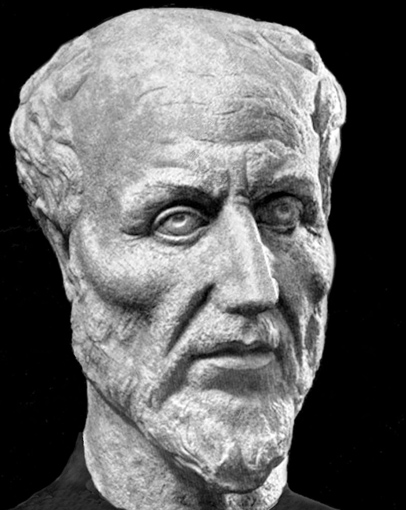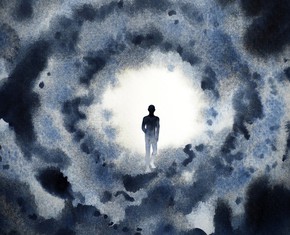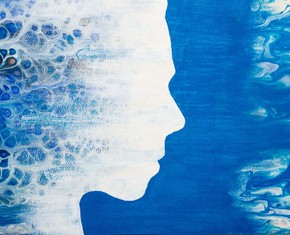The views expressed in our content reflect individual perspectives and do not represent the authoritative views of the Baha'i Faith.
Never lose an opportunity of seeing anything beautiful, for beauty is God’s handwriting. – Ralph Waldo Emerson
…every man hath been, and will continue to be, able of himself to appreciate the Beauty of God, the Glorified. …For the faith of no man can be conditioned by any one except himself. – Baha’u’llah, Gleanings from the Writings of Baha’u’llah, p. 143.
The love of the Word of God is the magnet of heavenly glory and beauty. – Abdu’l-Baha, Star of the West, Volume 5, p. 164.
Consider this for a moment: what’s the most beautiful thing you’ve ever seen? Was it a blooming flower, a sunset, a gorgeous mountain vista, a fertile rain forest, a surging ocean, the smiling face of a child?
Then consider this: how much more beautiful than those natural creations must their Creator be?

Plotinus
The classical Greek philosopher Plotinus, expanding on Plato’s universal metaphysics, asked and tried to answer that same basic question—where does beauty come from?
Plotinus, the author of The Enneads, the founder of Neoplatonism and perhaps the most influential of all the philosophers on both Christianity and Islam, wrote that authentic happiness consists of the true human identifying with the best in the universe; “A flight,” he called it, “from this world’s ways and things.” For him, the best in the universe was exemplified by what he named The One, that supremely beautiful and totally transcendent force beyond all limitations of being and non-being. Our goal as humans, Plotinus said, is attaining mystical union with the One—immersing ourselves in the liberation, enlightenment and ecstatic joy of that most great beauty.
Here’s the basic formulation of that classical and now very modern proof of the existence of God–what philosophers call the argument from beauty:
everything physically beautiful could conceivably be more beautiful
therefore all physical beauty falls short of perfection
therefore perfect beauty exists only in its eternal form
therefore the timeless idea of beauty comes from a non-material realm, independent and superior to the imperfect world of the senses
therefore perfect beauty describes God.
Modern philosophers have asked “Who made these beautiful changeable things, if not one who is beautiful and unchangeable?” Richard Swinburne, the contemporary British philosopher of religion, summarized the argument from beauty nicely:
…if there is a God there is more reason to expect a basically beautiful world than a basically ugly one. A priori, however, there is no particular reason for expecting a basically beautiful rather than a basically ugly world. In consequence, if the world is beautiful, that fact would be evidence for God’s existence.
These philosophical arguments for the existence of a Supreme Being have two components—the rational and the aesthetic. The Baha’i teachings combine them both, asking us to recognize not only God’s sovereignty, but also God’s grandeur:
How wondrous is the unity of the Living, the Ever-Abiding God — a unity which is exalted above all limitations, that transcendeth the comprehension of all created things! He hath, from everlasting, dwelt in His inaccessible habitation of holiness and glory, and will unto everlasting continue to be enthroned upon the heights of His independent sovereignty and grandeur. How lofty hath been His incorruptible Essence, how completely independent of the knowledge of all created things, and how immensely exalted will it remain above the praise of all the inhabitants of the heavens and the earth!
From the exalted source, and out of the essence of His favor and bounty He hath entrusted every created thing with a sign of His knowledge, so that none of His creatures may be deprived of its share in expressing, each according to its capacity and rank, this knowledge. This sign is the mirror of His beauty in the world of creation. – Baha’u’llah, Gleanings from the Writings of Baha’u’llah, pp. 261-262.
So the next time you see something beautiful in the natural world, think of it as a mirror of God’s beauty, and view it as a route to the transcendent, as a mere reflection of a greater and more lasting beauty in the spiritual realm.
You May Also Like
Comments

















When I was young, I was a naturalist. I though that humans and nature were just naturally good. When I went to college, I learned that there had been babies that had been either abandoned in the wilderness, or their parents had passed away leaving the babies. The babies had then been raised by monkeys. When the babies grew up, they exhibited the exact same characteristics as the monkeys did and none of human. ie. They did NOT grow up to be smart, loving and intelligent people.
This proved ...that knowledge was NOT inherently within the child. That human's were not born with knowledge. If humans were not born with knowledge, then it must come from outside ourselves. This proved to me that the source must be God.
The knowledge of God flows as a spring of knowledge through the chosen Prophets or Manifestations of God. They are the Divine educators of humanity. Without this Divine knowledge, humanity would remain ignorant, and bereft of all good human qualities. We are essentially, a mirror, when polished, reflecting the Divine attributes of God. Randy Focht. Contact me on Facebook.